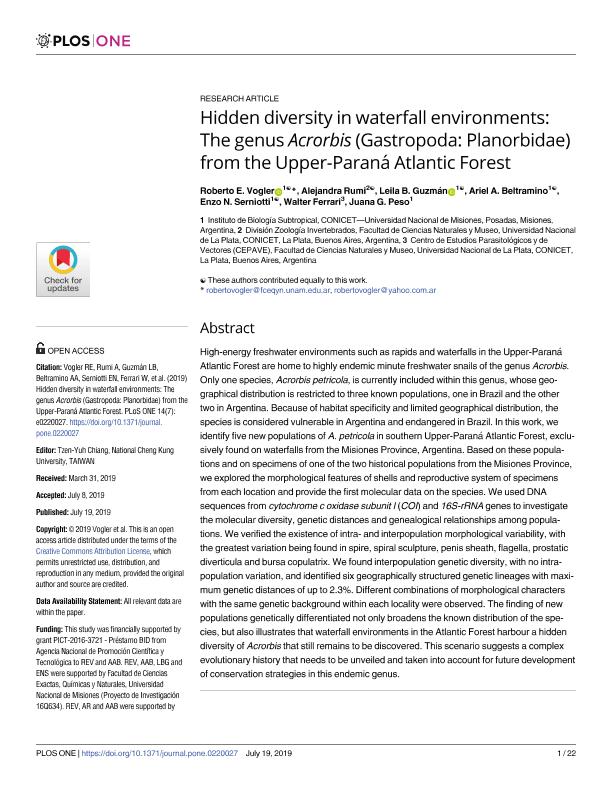Mostrar el registro sencillo del ítem
dc.contributor.author
Vogler, Roberto Eugenio

dc.contributor.author
Rumi Macchi Z., Alejandra

dc.contributor.author
Guzmán, Leila Belén

dc.contributor.author
Beltramino, Ariel Anibal

dc.contributor.author
Serniotti, Enzo Noel

dc.contributor.author
Ferrari, Walter Antonio Oscar

dc.contributor.author
Peso, Juana Guadalupe

dc.date.available
2021-01-08T14:19:17Z
dc.date.issued
2019-07-19
dc.identifier.citation
Vogler, Roberto Eugenio; Rumi Macchi Z., Alejandra; Guzmán, Leila Belén; Beltramino, Ariel Anibal; Serniotti, Enzo Noel; et al.; Hidden diversity in waterfall environments: The genus Acrorbis (Gastropoda: Planorbidae) from the Upper-Paraná; Atlantic Forest; Public Library of Science; Plos One; 14; 7; 19-7-2019; 1-22
dc.identifier.issn
1932-6203
dc.identifier.uri
http://hdl.handle.net/11336/121837
dc.description.abstract
High-energy freshwater environments such as rapids and waterfalls in the Upper-Parana´ Atlantic Forest are home to highly endemic minute freshwater snails of the genus Acrorbis. Only one species, Acrorbis petricola, is currently included within this genus, whose geographical distribution is restricted to three known populations, one in Brazil and the other two in Argentina. Because of habitat specificity and limited geographical distribution, the species is considered vulnerable in Argentina and endangered in Brazil. In this work, we identify five new populations of A. petricola in southern Upper-Parana´ Atlantic Forest, exclusively found on waterfalls from the Misiones Province, Argentina. Based on these populations and on specimens of one of the two historical populations from the Misiones Province, we explored the morphological features of shells and reproductive system of specimens from each location and provide the first molecular data on the species. We used DNA sequences from cytochrome c oxidase subunit I (COI) and 16S-rRNA genes to investigate the molecular diversity, genetic distances and genealogical relationships among populations. We verified the existence of intra- and interpopulation morphological variability, with the greatest variation being found in spire, spiral sculpture, penis sheath, flagella, prostatic diverticula and bursa copulatrix. We found interpopulation genetic diversity, with no intrapopulation variation, and identified six geographically structured genetic lineages with maximum genetic distances of up to 2.3%. Different combinations of morphological characters with the same genetic background within each locality were observed. The finding of new populations genetically differentiated not only broadens the known distribution of the species, but also illustrates that waterfall environments in the Atlantic Forest harbour a hidden diversity of Acrorbis that still remains to be discovered. This scenario suggests a complex evolutionary history that needs to be unveiled and taken into account for future development of conservation strategies in this endemic genus.
dc.format
application/pdf
dc.language.iso
eng
dc.publisher
Public Library of Science

dc.rights
info:eu-repo/semantics/openAccess
dc.rights.uri
https://creativecommons.org/licenses/by/2.5/ar/
dc.subject
ACRORBIS PETRICOLA
dc.subject
NEW RECORDS
dc.subject
ATLANTIC FOREST
dc.subject
ANATOMY
dc.subject
MITOCHONDRIAL MARKERS
dc.subject.classification
Genética y Herencia

dc.subject.classification
Ciencias Biológicas

dc.subject.classification
CIENCIAS NATURALES Y EXACTAS

dc.subject.classification
Conservación de la Biodiversidad

dc.subject.classification
Ciencias Biológicas

dc.subject.classification
CIENCIAS NATURALES Y EXACTAS

dc.title
Hidden diversity in waterfall environments: The genus Acrorbis (Gastropoda: Planorbidae) from the Upper-Paraná; Atlantic Forest
dc.type
info:eu-repo/semantics/article
dc.type
info:ar-repo/semantics/artículo
dc.type
info:eu-repo/semantics/publishedVersion
dc.date.updated
2020-11-18T17:03:38Z
dc.journal.volume
14
dc.journal.number
7
dc.journal.pagination
1-22
dc.journal.pais
Estados Unidos

dc.journal.ciudad
San Francisco
dc.description.fil
Fil: Vogler, Roberto Eugenio. Consejo Nacional de Investigaciones Científicas y Técnicas. Centro Científico Tecnológico Conicet - Nordeste. Instituto de Biología Subtropical. Instituto de Biología Subtropical - Nodo Posadas | Universidad Nacional de Misiones. Instituto de Biología Subtropical. Instituto de Biología Subtropical - Nodo Posadas; Argentina
dc.description.fil
Fil: Rumi Macchi Z., Alejandra. Universidad Nacional de La Plata. Facultad de Ciencias Naturales y Museo. División Zoología Invertebrados; Argentina. Consejo Nacional de Investigaciones Científicas y Técnicas. Centro Científico Tecnológico Conicet - La Plata; Argentina
dc.description.fil
Fil: Guzmán, Leila Belén. Consejo Nacional de Investigaciones Científicas y Técnicas. Centro Científico Tecnológico Conicet - Nordeste. Instituto de Biología Subtropical. Instituto de Biología Subtropical - Nodo Posadas | Universidad Nacional de Misiones. Instituto de Biología Subtropical. Instituto de Biología Subtropical - Nodo Posadas; Argentina
dc.description.fil
Fil: Beltramino, Ariel Anibal. Consejo Nacional de Investigaciones Científicas y Técnicas. Centro Científico Tecnológico Conicet - Nordeste. Instituto de Biología Subtropical. Instituto de Biología Subtropical - Nodo Posadas | Universidad Nacional de Misiones. Instituto de Biología Subtropical. Instituto de Biología Subtropical - Nodo Posadas; Argentina
dc.description.fil
Fil: Serniotti, Enzo Noel. Consejo Nacional de Investigaciones Científicas y Técnicas. Centro Científico Tecnológico Conicet - Nordeste. Instituto de Biología Subtropical. Instituto de Biología Subtropical - Nodo Posadas | Universidad Nacional de Misiones. Instituto de Biología Subtropical. Instituto de Biología Subtropical - Nodo Posadas; Argentina
dc.description.fil
Fil: Ferrari, Walter Antonio Oscar. Consejo Nacional de Investigaciones Científicas y Técnicas. Centro Científico Tecnológico Conicet - La Plata. Centro de Estudios Parasitológicos y de Vectores. Universidad Nacional de La Plata. Facultad de Ciencias Naturales y Museo. Centro de Estudios Parasitológicos y de Vectores; Argentina
dc.description.fil
Fil: Peso, Juana Guadalupe. Consejo Nacional de Investigaciones Científicas y Técnicas. Centro Científico Tecnológico Conicet - Nordeste. Instituto de Biología Subtropical. Instituto de Biología Subtropical - Nodo Posadas | Universidad Nacional de Misiones. Instituto de Biología Subtropical. Instituto de Biología Subtropical - Nodo Posadas; Argentina
dc.journal.title
Plos One

dc.relation.alternativeid
info:eu-repo/semantics/altIdentifier/url/http://dx.plos.org/10.1371/journal.pone.0220027
dc.relation.alternativeid
info:eu-repo/semantics/altIdentifier/doi/https://doi.org/10.1371/journal.pone.0220027
Archivos asociados
